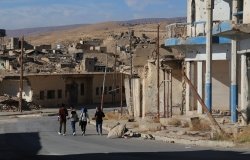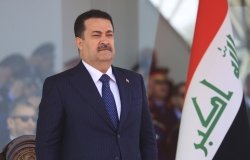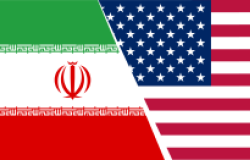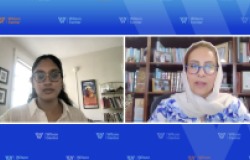Deciphering Russian Policy on Syria: What Happened…and What’s Next
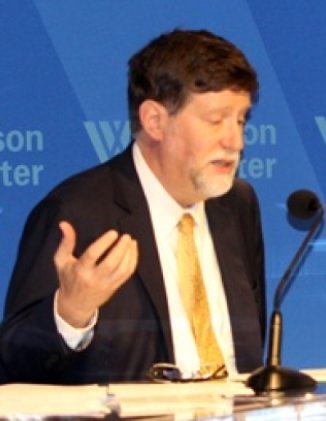

“Why has Moscow backed the Assad regime in Syria so strongly? More than anything else, this appears to be the result of Russian President Putin’s conviction that this is the right thing to do—both in foreign policy terms and in Russian domestic political terms,” said Mark N. Katz, Professor of Government and Politics, Department of Public and International Affairs, George Mason University at a 7 October 2013 Kennan Institute lecture.
A central principle of Putin’s foreign policy is reasserting Russia’s role as a great power on the global stage. Moscow has worked to restore and build ties to its former Cold War allies in the Middle East in pursuit of this goal. Some of these former allies, such as Algeria, have not shown particular interest in reciprocating. Others, such as the governments of Libya and Iraq, have fallen from power as the result of Western intervention. “Bashar al-Assad is Moscow’s last remaining Arab ally. If he falls, then Moscow will have no allies there,” Katz observed.
Moscow is also greatly concerned that if Assad should fall, his regime would be replaced by Sunni extremists that would be hostile to both Russia and the West. Should Sunni radicals gain power in Syria, Moscow believes, then the possibility of increased extremism within the Muslim regions of Russia and Central Asia would rise.
Russia’s policy of support towards Assad is supported in part by its low cost in relation to its other foreign policy priorities, said Katz. First among these calculations is the Obama administration’s clear unwillingness to become militarily involved in Syria or provide decisive support to the Syrian opposition. This hesitance is perceived in Moscow that Washington is also concerned by the possibility of extremists rising after Assad’s fall. Turkey opposes Russia’s support of Assad, but Russian-Turkish trade is booming and Putin and Erdogan seem to have agreed to disagree on Syria. Assad’s Syria is hostile toward Israel and is aligned with two of its greatest foes, Iran and Hezbollah. Yet because Israel fears an even more hostile regime would replace Assad, Moscow feels that Israel is on its side in urging restraint in acting against Assad.
Moscow’s policy toward Syria has not appreciably damaged its relations with most Middle Eastern governments—with the exception of Saudi Arabia and Qatar. Moscow sees these two as key supporters of radical Sunni elements in Syria and beyond, including Central Asia and Russia itself. “Their actions, or perhaps more accurately Moscow’s interpretation of their actions, have only served to intensify Moscow’s desire to prevent the violent downfall of the Assad regime at the hands of Sunni radical forces,” said Katz.
Russia’s foreign policy calculations were challenged over the summer, according to Katz: “President Obama’s threat of a military strike at Syria in response to the Assad regime’s use of chemical weapons against its opponents in August 2013 was a departure from this pattern.” The American reluctance to strike was still obvious from Obama’s seeking Congressional authorization, Congress’s obvious unwillingness to grant it, and Obama’s quick acceptance of the Russian proposal to place Syria’s chemical weapons under international control. But the risk of an unwanted strike had increased, leading to Moscow making the chemical weapon proposal.
Moscow’s clear outcome preference to the Syrian civil war is similar to what Assad’s father achieved in 1982 or what Putin and the Kadyrov clan achieved in Chechnya: the defeat of the Islamist opposition and the restoration of state security service control. The more likely outcome at present, however, is an indefinite continuation of the war, despite Russian and Iranian support for the Syrian government. Moscow is therefore stuck in something of a quagmire, observed Katz.
The longer the quagmire continues, predicted Katz, the greater the likelihood that the crisis will be resolved in a way that ultimately reduces Russia’s influence in Syria. A negotiated settlement would require the involvement of many outside players, and the end result of such a process would probably increase the influence in Syria of Assad’s adversaries and decrease the influence of Assad’s supporters, including Russia.
Should the conflict endure, outside events such as an American-Iranian rapprochement could complicate Russia’s Syria policy: Were Iran to end support for Assad as part of a rapprochement, Moscow would be left virtually alone supporting Assad. Alternately, if Iran were to expand its support for Assad, Moscow would have less ability to pressure Assad into making any concessions towards resolving the conflict.
“While Russia can help the Assad regime avoid being overthrown,” concluded Katz, “it is not in a strong position to end the war either through helping Assad crush his enemies or provide the requisite incentives and disincentives for a successful conflict resolution effort.”
F. Joseph Dresen
Matthew Rojansky, Director, Kennan Institute
About the Author


Kennan Institute
The Kennan Institute is the premier US center for advanced research on Russia and Eurasia and the oldest and largest regional program at the Woodrow Wilson International Center for Scholars. The Kennan Institute is committed to improving American understanding of Russia, Ukraine, Central Asia, the Caucasus, and the surrounding region though research and exchange. Read more






